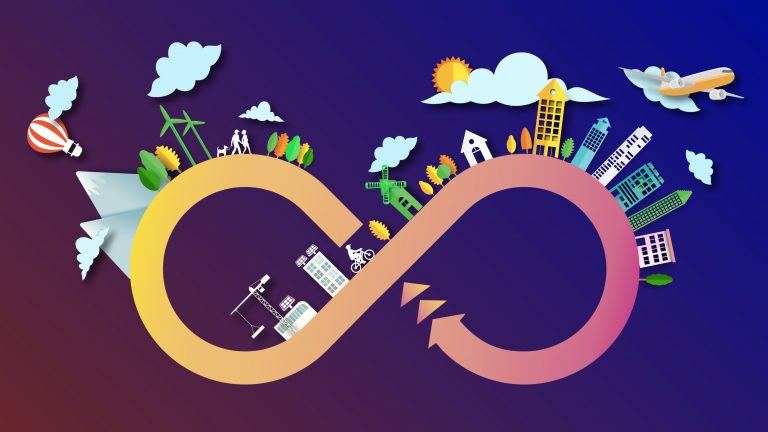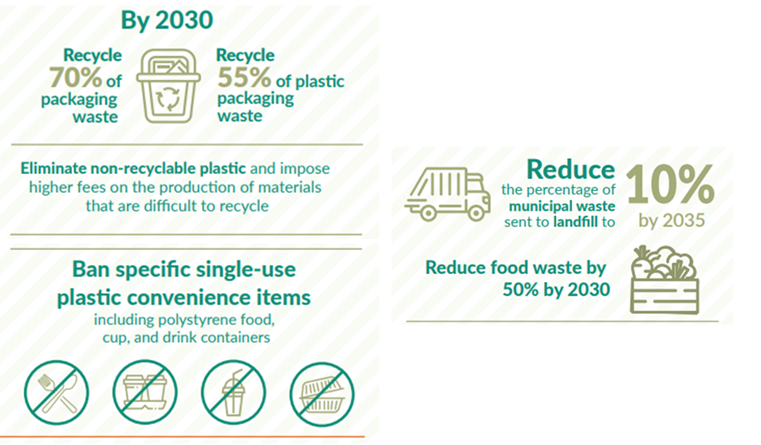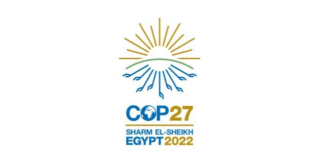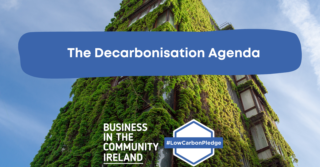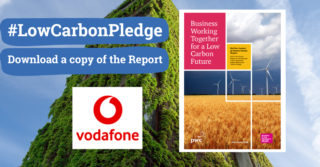Circular Economy developments from the Irish Government
On October 18th, the Department of Public Expenditure and Reform released a circular with guidelines intended to promote the use of environmental and social considerations in public procurement. It did so recognising “the public service must demonstrate its commitment to sustainable development and use its influence to persuade others of the changes required to reduce its impact on the environment.”[1] The Irish Government procures €12bn worth of goods and services each year. By issuing the guidelines and setting an overall 50% target for Green Public Procurement (GPP) by the State, it aims to “underpin the credibility of national environmental policy objectives and enhance Ireland’s image as a green economy”1.
What does this have to do with Circular Economy though? We recently discussed this with Bernie Kiely, Assistant Principal, and Dr Irene Cadogan, Higher Executive Officer of the Waste Policy and Resource Efficiency Division of the Department of Climate Change Action and Environment (DCCAE). The DCCAE, along with the Office for Government Procurement (OGP) are responsible for supporting the Government’s adoption of Green Public Procurement.
As we’ve previously discussed, 60% of Climate Change could be solved with a fully circular economy, but today the world is only 9% circular. In October, the DCCAE and the EPA held a series of briefings and stakeholder consultations on Circular Economy and Green Public Procurement policy, firmly establishing the link between the Government’s Climate Action Plan and concrete actions to reduce waste and associated Co2 emissions.
These are the Waste and the Circular Economy targets outlined in the Climate Action Plan[2]
Q: According to the Climate Action Plan, “Irish and regional waste policy is based on a waste hierarchy: waste prevention; preparing for reuse; recycling; and energy recovery; with disposal, namely landfill, being the least desirable option.” Thanks to the leadership provided by the Climate Action Plan, the current waste policy is evolving toward a more circular approach. What is the DCCAE’s role in guiding this transition?
A: For a number of years Waste Policy in Ireland has been developing in line with the central elements of the Circular Economy. The work already underway is aligned with the key themes set out in Circular Economy Actions Plans in place across Europe. Some of the ongoing activities for Ireland include;
- The removal of the flat fee for household waste collection to encourage waste reduction and increase household recycling;
- A landfill levy of €75 per tonne charged to all waste operators disposing of waste at landfill sites that makes household waste disposal at landfill much more expensive than proper segregation and recycling;
- Support of the ‘National Waste Prevention’ and ‘Stop Food Waste’ programmes;
- Support of research and innovation through the EPA Research call and Green Enterprise funding;
- Extended Producer Responsibility schemes for WEEE, Batteries, Packaging, End of Life Vehicles, Tyres, Farm Films and Plastics;
- Legal targets for recycling and recovery across a range of waste streams.
In addition, we are improving alignment between waste policy and the circular economy by initiating a review of “A Resource Opportunity – Waste Management Policy in Ireland” in 2019. This review will inform the development of future national and regional waste management policy, including our environmental goals, regulatory and market structures, policy instruments and tools taking into consideration the impact of the EU Circular Economy package.
A full public consultation on Ireland’s Circular Economy strategy will be launched before the end of this year. This strategy is expected to replace the current suite of plans and programmes in 2020-21. Inspired by the EU’s Circular Economy Action Plan, Ireland’s response will provide policy direction on waste prevention, eco-design, reuse, repair, recycling, recovery and diverting waste from landfill, and lead a cross-Government reflection on how these principles can be embedded throughout our public policy frameworks.
Q: In an earlier article we identified consumer behaviour as a key barrier to a more circular economy. Some of the initiatives above, like transitioning from flat waste fees to pay-by-weight, drive behaviour change by incentivising the right behaviours. Can you comment on how you integrate behaviour change into initiatives meant to transition from waste to circular economy?
A: Behaviour change is always a challenge but as you can see from the initiatives already underway we have been working on a range of education and awareness programmes intended to positively influence consumer choices while also developing capacity to support those choices in businesses and the public sector. These initiatives include:
- Funding of a number of education, awareness and information campaigns and programmes through Green Schools, the Regional Waste Management Planning Authorities and the EPA’s National Waste Prevention Programme which all work towards preventing waste in our communities;
- MyWaste.ie – a new “one stop shop” website for householders;
- Funding and supports for Community Reuse Network Ireland and the Rediscovery Centre;
- The Green Government Initiative;
- Green Public Procurement policy development.
Q: The Government has a dual role in the Circular Economy, both encouraging sustainable procurement by businesses and consumers and also adopting sustainable procurement practices itself. Right now the Government’s Green Procurement Programme (GPP), which is linked to the Circular Economy, has prioritised eight key areas. Why were these areas chosen?
A: The Irish Government’s purchasing power (12% of GDP) has enormous potential to reduce carbon emissions and protect our environment while saving money over the full lifecycle of goods and services. Government commitment to GPP sends a powerful signal to the market that the Government values projects, products and services that are both economically and environmentally viable. The eight priority areas identified in the EPA Guidance (2014) were chosen on the basis of the quantum of expenditure; scope for environmental improvement; leadership to market potential; relevance and accessibility of criteria; market availability and economic efficiency (in line with EU policy and practice). Additional EU guidance and green criteria are available for over twenty categories.
Work on green procurement has intensified in 2019 and our Department continues to work closely with the Office of Government Procurement to ensure environmental criteria are included as new frameworks are developed. The DCCAE is also a partner in the Interreg Project GPP 4 Growth, a collaborative partnership across nine countries that supports the implementation of resource efficiency policies that promote eco-innovation and green growth through GPP. The Minister for Finance & Public Expenditure and Reform, Paschal Donohoe TD; and the Minister for Communications, Climate Action and Environment, Richard Bruton TD, continue to work together to ensure GPP implementation.
Q: GPP is focused on products and services, rather than overall sustainability maturity of the company. Can you comment on why?
The procurement procedure is complex and green or circular criteria can be included at certain points but it is important that their inclusion does not go against procurement law. The criteria developed by the EPA and the EU set out where it is possible to include these criteria in the tendering process. The overall sustainability of the company can be taken into consideration but this must be done at the appropriate stage of the procurement process.
The Department obviously cannot be involved in making procurement decisions for individual purchasing bodies given the complexity and diversity of their procurement requirements; however, we will be advocating the use of both the Irish and EU criteria. There is really good work already going on in this space and we don’t want to hinder any innovation or impede tenderers from exceeding standard green criteria.
We are working to support the adoption and expansion of green procurement through a national training plan currently under development and by updating the national green procurement guidance and criteria.
Q: Finally, how optimistic are you that Ireland will achieve the waste targets outlined in the Climate Action Plan, and what key enablers are there to facilitate progress and what key barriers must be overcome?
A: Reaching some of the climate action targets may be difficult, but I think we are at a point in time where people are more willing to make significant behavioural changes and organisations are already starting to adjust their business practices.
NESC’s “Moving towards the Circular Economy in Ireland (2017)”, found that there is momentum in circular economy practices in Ireland, but more action is needed to build early advantage. The report concluded that while the full potential of the circular economy for Ireland has yet to be identified there are surprising pockets of innovation and some very well established businesses at the frontier of the circular economy. Businesses who are already engaging in Circular Economy can help spread the word across their sphere of influence to amplify and reinforce its adoption.
Additionally, the report noted that strong central policy support is required to embed the circular economy into national policy priorities, including enterprise, regional, rural and climate action. The Government Climate Action Plan demonstrates an intensification of high level political support for embedding these principles across all government activity. This senior government commitment, including the commitment to new governance structures, will deliver necessary progress and hold responsible actors to account for their outlined actions. This is a huge step in the right direction.
Stay tuned as next month we’ll feature BITCI member stories as part of RTE’s Climate Week events.
[1] : https://ogp.gov.ie/wp-content/uploads/DPER-Circular-20-2019.pdf
[2] https://www.dccae.gov.ie/en-ie/climate-action/publications/Documents/16/Climate_Action_Plan_2019.pdf
